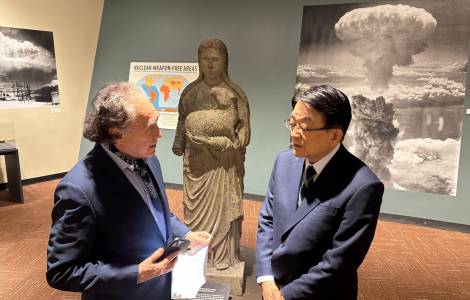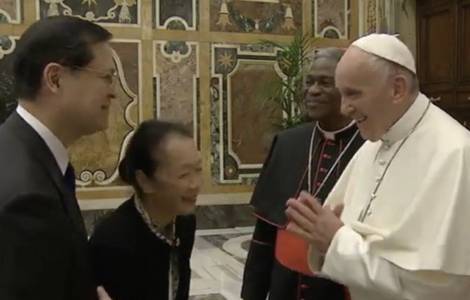
by Victor Gaetan *
“Jesus and Buddha were peacemakers and promoters of non-violence,”
Pope Francis, May 28, 2022
Nagasaki (Agenzia Fides) - At the United Nations headquarters in New York City, on the third floor, a solemn statue of St. Agnes, holding her namesake lamb, stands as a disturbing reminder of nuclear destruction.
The saint, known for resisting multiple attempts to kill her, survived an atomic bomb dropped on Nagasaki by the United States on August 9, 1945. The bomb exploded 500 meters from Urakami Cathedral, Asia’s largest Catholic church at the time. The bomb incinerated 60-80,000 people, of whom no more than 150 were soldiers. St. Agnes was found face down in the cathedral’s rubble.
Declassified Pentagon documents solve the puzzle of why Nagasaki was targeted despite not being included in the initial list of targets: at the last-minute, the city was added in handwriting, by an unknown hand, to obliterate the most historic Catholic community in Japan as retribution Retribution for the Vatican's 1942 establishment of diplomatic relations with Japan. The US couldn't forgive the Vatican for establishing diplomatic relation with its enemy, Tokyo).
Hibakusha Voices
In front of the UN’s St. Agnes statue, I met anti-nuclear campaigner, Hirotsugu Terasaki, director general of the lay Buddhist movement, Soka Gakkai International (SGI), representing some 12 million people worldwide. Founded in 1930, Soka Gakkai is Japan’s largest organized religious group.
SGI is dedicated to the teachings of Nichiren, a 13th century Japanese Buddhist priest. Soka University in Tokyo and Aliso Viejo, California are also associated with the faith tradition. A regular collaborator with the Holy See, SGI was a participating partner at the Vatican’s 2017 conference “Prospects for a World Free of Nuclear Weapons and for Integral Disarmament.” Pope Francis sent public condolences when SG’s highly influential third president, Daisaku Ikeda, died last November at age 95.
Terasaki was at the UN to attend the second Meeting of State Parties to the Treaty on the Prohibition of Nuclear Weapons (TPNW), an ambitious disarmament treaty—the first prohibiting countries from possessing nuclear arms—signed by 93 countries, most recently Sri Lanka. It went into effect January 22, 2021.
Terasaki explained that SGI’s disarmament commitment stretches back over half a century and is directly connected with his country’s tragic experience of nuclear holocaust. The Soka Gakkai youth division in Japan started a campaign in 1972 aimed at “protecting the fundamental human right to survival” by gathering and documenting the wartime testimonials of Japanese nuclear survivors known as hibakusha (bomb-affected-people). Over the next 12 years, students collected thousands of testimonies, which eventually filled 80 volumes.
“My personal involvement brought me face-to-face with the harrowing accounts of hibakusha,” Terasaki recalled. “There were some who initially agreed to being interviewed, but once it began, they were voiceless, choked by the weight of their anguish and pain. Yet, there were those who bravely shared their persistent suffering and trauma. I was in a state of utter shock witnessing their visceral outpourings of pain. It shook the depth of my soul. These testimonials seared in my consciousness the inhumanity of nuclear devastation.”
Of 650,000 hibakusha recognized by the Japanese government, over 113,000 are alive. To this day, they influence the contemporary disarmament movement by inspiring its leaders: “These individuals form the foundation of building peace,” summarized Terasaki.
Partnering with ICAN
A fortuitous partnership helped amplify SGI’s anti-nuclear commitment in 2007. The International Physicians for the Prevention of Nuclear War (which won a Nobel Peace Prize for creating public awareness of the catastrophe of nuclear weapons in 1985) initiated the International Campaign to Abolish Nuclear Weapons (ICAN) and asked SGI to sign on as an early collaborator to help gain global approval of the TPNW. Both were especially committed to mobilizing youth.
Terasaki remembered, “To realize our vision of a nuclear-free world, we felt compelled to forge a vast global network committed to educating people about the devastating realities of nuclear weapons. Our efforts began by organizing study groups for diplomats around the world, heightening awareness of the aftermath of nuclear exposure”—again, putting the humanitarian impact at the center of the discussion. Regional anti-nuke conferences, from Central Asia to the Caribbean, and directly lobbying foreign ministries were two other tactics.
In the span of merely a decade, the TPNW was adopted by the United Nations in July 2017. The Holy See was one of the first signatories. “This was indeed a miraculous achievement,” confirmed Terasaki, who credits many other organizations with contributing to the success, including Pax, the Dutch Catholic peace group, and the World Council of Churches.
No surprise, TPNW has not been signed by the nine countries with nuclear capability: Russia (5,889 warheads); US (5,224 warheads); China (410); France (290); United Kingdom (225); Pakistan (170); India (164); Israel (90); and North Korea (30). Nor have five states hosting nuclear weapons for the US signed: Italy (35); Turkey (20); Belgium (15); Germany (15); or Netherlands (15) according to ICAN.
Most inhumane weapons
The main message of TPNW campaigners is that nuclear weapons are the most inhumane weapons ever created. They violate international law, cause severe environmental damage, undermine global security, and divert budgets from addressing human needs. Nuclear weapons must be eliminated, not just controlled.
Yet, a cover story in the magazine Scientific American last December warned about the U.S. government’s plans to upgrade its nuclear capacity with an additional $1,5 trillion to modernize its nuclear arsenal. Presently, there are approximately 12,500 nuclear warheads worldwide, with the United States and Russia holding nearly 90% of the stockpile.
Explained Terasaki, “The current plan to expand nuclear capabilities stems from an unwavering belief in the utility of nuclear deterrence. Yet, we must question whether this policy is a sound political strategy or is it a myth created to perpetuate nuclear armament.”
He continued, “Advancing the current nuclear expansion will not yield peace and security based on global nuclear balance but will precipitate global destruction or Armageddon.”
Moral discourse
I asked Terasaki, how he describes the unique role being played by faith-based organizations such as SGI, in the new, emerging disarmament movement, as typified by the TPNW? He explained that while TPNW’s next steps are largely diplomatic and state-centric, faith-based organizations must continue highlighting the negative impact of nuclear arms from a spiritual and humanitarian perspective.
“As the world grapples with escalating challenges, the influence of moral discourse becomes ever more pertinent,” he said. This is a position strongly maintained by the Holy See.
At the same time, Soka Gakkai’s affiliation with the Komeito party (NKP), founded by Daisaku Ikeda in 1964 gives it unique influence on perceptions of governing elite; it’s not “just” a Buddhist lay entity. In the 1960s, Ikeda advocated for the reopening of China-Japan relations. He visited China ten times between 1974 and 1997, meeting with leaders Zhou Enlai and Deng Xiaoping. In the 1970s, Ikeda traveled to the Soviet Union and met with Premier Aleksey Kosygin, passing conciliatory messages between Beijing and Moscow, at the height of China-USSR tensions. NKP has been the Liberal Democratic Party (LPD) junior partner since 1999.
Ikeda’s vision converged with Pope Francis: The Japanese leader observed, “In the end, peace will not be realized by politicians signing treaties. Human solidarity is built by opening our hearts to each other. This is the power of dialogue.”
Kazakhstan and Bahrain
Teresaki described two inspiring images of collaboration witnessed in his travels to promote peace, denuclearization, and cross-cultural dialogue: In 2022 he attended both the Seventh Congress of Leaders of the World and Traditional Religions in Kazakhstan as a Buddhist representative, and, a month later, he was in Bahrain for the forum “East and West for Human Coexistence.”
The events put him in close proximity to Pope Francis, whose encyclicals “resonate deeply with me,” said Terasaki.
“I was particularly moved seeing the reconciliatory atmosphere between Catholic and Sunni Islamic leaders sitting in the same room,” observed the Japanese leader. “These forums offered a promising platform for religious leaders from across the globe to engage in candid and meaningful discourse, sharing insights and wisdom on the pressing global issues facing humanity.”
According to Terasaki, a fundamental Buddhist tenet informing SGI anti-nuclear advocacy is that individual and society’s security are one and interdependent. The Mahayana tradition followed by SGI emphasizes how an individual, through discipline and deepening practice, works change within that impacts the external world.
“SGI is committed to safeguarding dignity of life, happiness of all individuals, and the collective security of the world. Reliance on nuclear arms fundamentally contradicts these aims, as they jeopardize the very security we seek,” he summarized.
As Pope Francis declared at Nagasaki in 2019, “Peace and international stability are incompatible with attempts to build upon the fear of mutual destruction or the threat of total annihilation. They can be achieved only on the basis of a global ethic of solidarity and cooperation.”
(Agenzia Fides, 17/1/2024)
*Victor Gaetan is a senior correspondent for the National Catholic Register, focusing on international issues. He also writes for Foreign Affairs magazine and contributed to Catholic News Service. He is the author of the book God’s Diplomats: Pope Francis, Vatican Diplomacy, and America’s Armageddon (Rowman & Littlefield, 2021) published in paperback in July 2023. Visit his website at VictorGaetan.org
